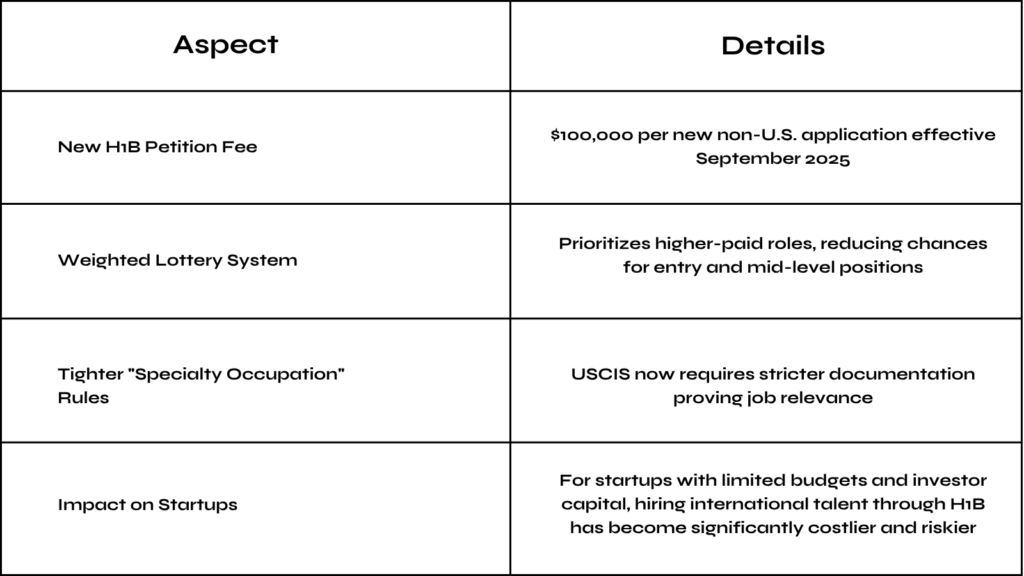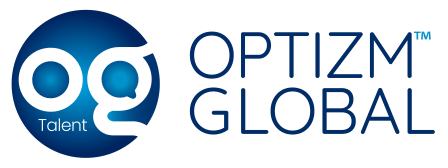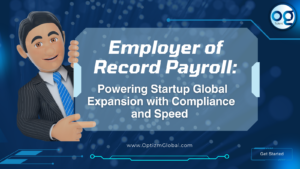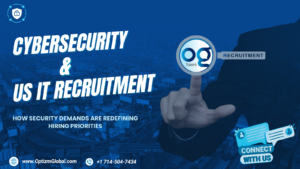When the U.S. government put a $100,000 fee for filing new H1B petitions, it wasn’t simply another administrative obstacle — it was a wake-up call to tech startups that depend on foreign talent. The H1B visa has always been a pillar of American innovation, driving Silicon Valley’s growth and assisting early-stage businesses to grow at an accelerated rate.
But with increasing expenses, stricter guidelines, and a dwindling lottery pool, startups are now wondering: Is the old visa pathway still worthwhile — or should we retool the way we bring in talent from all over the world?
Let’s see how Employer of Record (EOR) solutions can get you past the H1B bottleneck, save you money, and still get you top-notch IT talent — without ever having to submit a visa.
The Reality: H1B Hiring Is Getting Tougher
Startups have long looked at the H1B visa as the fulcrum between U.S. ingenuity and international talent. But the 2025 reforms have shifted the calculation:
- $100,000 H1B petitioning fee for new non-U.S. applications effective September 2025 Boundless Immigration
- Weighted lottery that favors higher pay levels, lowering the odds for entry and middle-level positions Dykema .
- Tighter “specialty occupation” examination by USCIS, demanding tight documentation of relevance to the job https://www.uscis.gov/

For a startup operating on investors’ money and lean payrolls, these changes translate to one thing — bringing in global talent via H1B is now a costly bet.
The H1B Route: The Hidden Costs
Long before the new fee; the H1B path was not inexpensive either. With legal submissions, compliance, visa sponsorship, and administrative overhead, startups could end up paying $10,000–$30,000 per hire — in some cases waiting months for approval.
And now, thanks to the new regulations, that number could exceed $120,000 just to hire one foreign employee. And that doesn’t include delays, denials, or reapplications. For most early-stage founders, this model just isn’t viable anymore.
The EOR Advantage: A Smarter Global Hiring Model
Step in the Employer of Record (EOR) — a progressive solution that allows startups to hire global talent without establishing foreign entities or working with visa limitations. Here’s the process:
- The EOR is the employer of record in the country where you want to hire (such as India, Poland, or the Philippines).
- Your company controls the work, performance, and results of the employees.
- The EOR is responsible for local payroll, taxes, benefits, and compliance.
Platforms such as Optizm Global have demonstrated that startups can expand internationally with ease, hiring talented engineers in places like India and Brazil without breaking labor laws or visa rules.

Why Startups Are Switching to EOR from H1B
Cost Efficiency:
By saving on visa charges and legal fees, startups can save thousands per employee. EOR expenses are predictable — usually a flat monthly fee.
Speed:
Whereas H1B petitions can take months to process, onboarding through an EOR can happen in as little as 2 weeks.
Hassle-free compliance:
The EOR takes on workforce regulations, employee benefits, and tax obligations at the local level. No subsidiary to open.
Remote-First Flexibility:
With remote work globally embraced by all sectors, startups can get the best engineers where they’re located, not where visas permit.
No Cap or Lottery:
Forget trying to get one of the few H1B available slots — there are no annual caps with EOR hiring.
Example- A company required expanding its backend talent pool rapidly after failing the H1B lottery in two consecutive years. Instead of waiting for the next round, they enlisted an EOR in India.
In about 30 days, they onboarded five full-time developers — compliant, payroll, and remote. The company saved nearly $400,000 in visa and start-up costs in year one, and accomplished product
Best Practices for Startups Using EOR
Select an EOR that has in-country legal entities (not merely partner companies). This will ensure IP protection and direct compliance management.
- Begin small and scale over time. Pilot the workflow with a pilot group.
- Prioritize culture and communication. Leverage frequent syncs, video check-ins, and mentorship initiatives to onboard remote recruits smoothly.
- Carefully review contracts. Ensure that they align with your organization’s policies on IP, confidentiality, and data security.
The Bottom Line: Change Your Thinking about “U.S.-Only” Employees
The $100,000 H1B fee is more than a financial cost – it is a reminder that the future of work is not bounded by borders. Rather than racing after a scarce visa allocation, startups can use EOR solutions to onboard the best world talent directly, quicker, and cheaper.
For contemporary founders, this isn’t merely an HR choice — it’s a business one.
The startups that shift now will assemble slimmer, more global staff — while their competitors hold up in line for approval.






